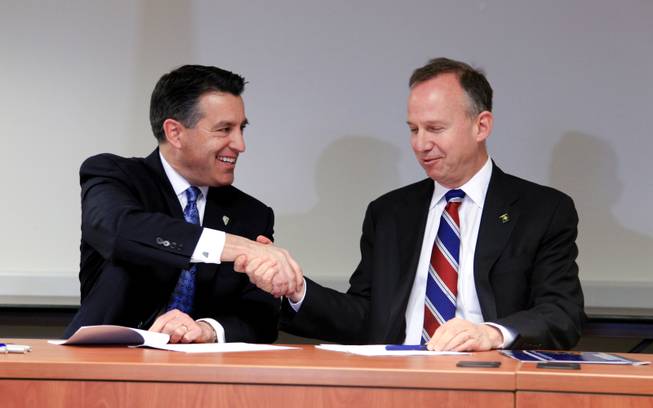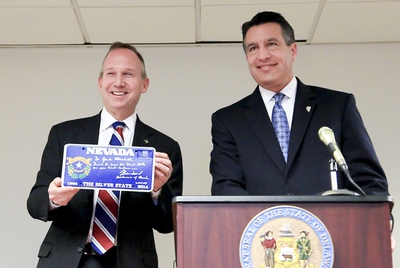
Nevada Gov. Brian Sandoval, left, and Delaware Gov. Jack Markell shake hands after signing the Multi-State Internet Gambling Agreement in the Delaware State Office Building in Wilmington Tuesday morning, Feb. 26, 2014.
Published Tuesday, Feb. 25, 2014 | 8 a.m.
Updated Tuesday, Feb. 25, 2014 | 3:44 p.m.
Read the agreement
WILMINGTON, Del. — Online poker enthusiasts in Nevada soon will be able to play across state lines, after Gov. Brian Sandoval this morning signed a deal with Delaware to create the country’s first, fully legal interstate Internet gaming partnership.
“We’re standing in a moment of history today,” Sandoval said at a news conference with Delaware Gov. Jack Markell. “We hope (the deal) will serve as a model for multistate collaboration and that other states will see the benefits of the agreement and soon decide to join for themselves.”
The agreement — which was months in the making — is the first partnership between states to bridge previous barriers to interstate online gaming since the Department of Justice opened up the possibility in late 2011.
Prior to 2011, the Unlawful Internet Gambling Enforcement Act of 1961, or UIGEA, had successfully prohibited banks from processing any bets made in prohibited forms of gaming.
But the Justice Department’s re-reading of the 1961 Wire Act determined that only sports betting was patently illegal, and that Internet transactions between states where gaming is legal should be viewed as legal.
Tuesday is the first time, however, two states have actually cemented a cooperative agreement on the basis of the new rules.
“The first conversation Governor Sandoval and I had about it was when I was visiting Carson City, which I believe was last spring,” said Markell, who credited Sandoval for approaching him with the idea.
“We began that conversation because we know that Delaware and New Jersey were the only other states that were looking at passing online gaming,” Sandoval said. “We wanted to get ahead of the curve with that, and the conversation began in earnest subsequent to the passage of the bill.”
By last spring, Nevada had passed a bill legalizing online poker statewide, and both governors were pretty certain the federal effort to legalize poker nationwide had faltered.
“We can’t wait,” Sandoval said of Washington’s continued, on-again, off-again wrangling with legalizing online poker. “I see this as an opportunity for the states to show leadership, and it’s good for gaming, it’s good for business, and it’s good for the economies of our two states. “
The point of the cooperation, both governors said, is to grow the pool of potential players, thereby increasing liquidity in the game and revenue for the participating states.
For individual players, the new planned platform won’t look that much different from how players currently get online.
Nevadans hoping to take advantage of the expanded online poker still will have to log on through the websites of the sites licensed in the Silver State; Delaware players will have to do the same with sites licensed in their state.
The rules about physical location are also the same: Players still have to be physically in either Nevada or Delaware to take advantage of the virtual gaming arena.
Once logged in, players will be able to play poker against each other at the same virtual tables – though the governors were not yet sure if individual players would be identified as being from either Nevada or Delaware once in the poker rooms.
Players still will be subject to the specific regulations of play in their home state – and the states will split the revenues made from the games based on where the participating players are from.
The governors had no specific estimate about how much additional revenue the cooperation would yield.
Estimates for the potential eventual worth of the legal online poker industry range from $2 billion to over $3 billion per year. In Nevada, industry watchers have guessed that the state’s current $3 million per-year online gaming industry could be worth up to $50 million per year if online poker goes nationwide.
No one is expecting anywhere near that level of expansion under the agreement signed today, as there are fewer than a million residents in Delaware.
But it was clear that today’s agreement was as much a blueprint for future interstate compacts as it was a contract in its own right.
“We are two small states – but we’re two proud states and we can set a shining example of how to do this,” Sandoval insisted. “The whole point of this is to have more players and to set this example, so that other states will see there’s a great opportunity to join this agreement.”
“More states means more players, which means more revenue for participating states,” Markell said. “That’s why we wanted this agreement to be able to expand.”
But before the agreement can become an enticing example to other states, it has to go live – and neither governor had a clear prediction as to when Nevadans and Delawareans would actually be able to begin playing against each other.
“We don’t have any dates yet,” Markell said.
“It’s up to the providers whether they want to be part of this,” Sandoval added.
For many casinos, taking advantage of this opportunity is a no-brainer – even if they are still working out the details of how they will proceed.
Take Nevada-based Caesar’s Entertainment, for example.
Caesar’s owns WSOP.com, one of three gaming sites that has been licensed in Nevada. Station Casinos and South Point operate the other two. Caesar’s also has a partnership with 888, which operates all three of Delaware’s licensed poker sites.
The combination means there is already a common provider base on which to build under the compact – and the potential to rake in a lot of money if it works and expands.
“This is a good first step for states to decide how they want to play, what they want to play,” said Jan Jones, chief lobbyist for Caesar’s. “We’re very optimistic.”
However, even if the cooperation is successful, expansion beyond Nevada and Delaware is not a foregone conclusion.
Sandoval has been speaking with New Jersey about concluding a similar interstate arrangement, but as of yet, no third state has public plans to partner with Nevada and Delaware on Internet poker.
There is also a potential complication in terms of scope: While the Nevada-Delaware agreement is strictly limited to poker, other states may want to pursue cooperative agreements including other casino games.
“We set minimum standards that must be met by any state that wants to join the agreement,” Markell said, though he later added: “We would certainly be willing to consider other games.”
Delaware’s portfolio of legal online games includes blackjack, roulette and even slots alongside poker. Nevada’s law limits online gaming to poker.
Beyond Nevada, New Jersey and Delaware, no state has legalized any form of online gaming.


Join the Discussion:
Check this out for a full explanation of our conversion to the LiveFyre commenting system and instructions on how to sign up for an account.
Full comments policy